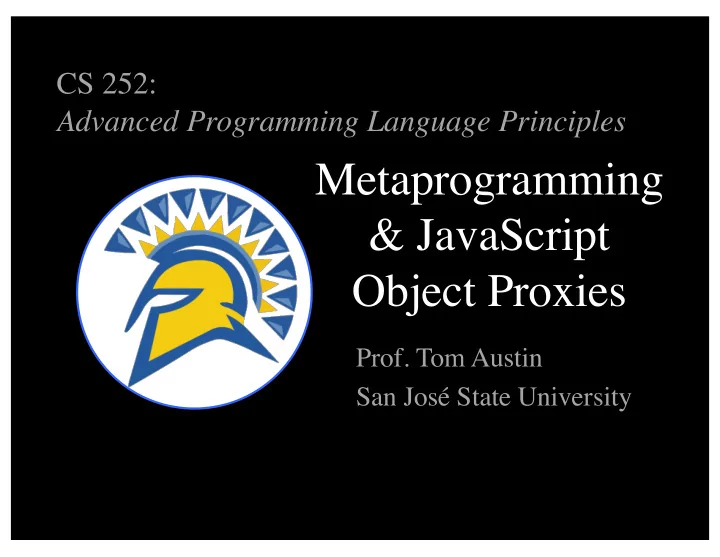

CS 252: Advanced Programming Language Principles Metaprogramming & JavaScript Object Proxies Prof. Tom Austin San José State University
ECMAScript Schism • ECMAScript 4 was divisive • A group broke off to create ECMAScript 3.1 – more minor updates – later became ECMAScript 5 • Adobe left the fold
ES6 Harmony: Can't we all just get along? • ECMAScript 6 (ES6) Harmony – Later renamed ECMAScript 2015 • New features: – classes – block scoping – arrow functions (lambdas) – promises – proxies
let is the new var
function makeListOfAdders(lst) { var arr = []; for (var i=0; i<lst.length; i++) { var n = lst[i]; arr[i] = function(x) { return x + n; } } return arr; } Prints: 121 var adders = 121 makeListOfAdders([1,3,99,21]); 121 adders.forEach(function(adder) { 121 console.log(adder(100)); });
function makeListOfAdders(lst) { let arr = []; for ( let i=0; i<lst.length; i++) { let n = lst[i]; arr[i] = function(x) { return x + n; } } return arr; } Prints: 101 var adders = 103 makeListOfAdders([1,3,99,21]); 199 adders.forEach(function(adder) { 121 console.log(adder(100)); });
Arrow functions • Concise function syntax
function sort (lst, fn) { for (let i=0; i<lst.length; i++) { for (let j=0; j<lst.length-1; j++) { if (fn(lst[i], lst[j])) { let tmp = lst[i]; lst[i] = lst[j]; lst[j] = tmp; } } } } let arr = [1,2,99,10,42,7,-3,88,6]; sort(arr, function(x,y) { return x<y; });
function sort (lst, fn) { for (let i=0; i<lst.length; i++) { for (let j=0; j<lst.length-1; j++) { if (fn(lst[i], lst[j])) { let tmp = lst[i]; lst[i] = lst[j]; lst[j] = tmp; } } } } let arr = [1,2,99,10,42,7,-3,88,6]; sort(arr, (x,y) => x<y ); //sort(arr, function(x,y) { return x<y; });
Proxies
What is metaprogramming ? Writing programs that manipulate other programs.
JavaScript Proxies Metaprogramming feature proposed for ECMAScript 6 (Harmony). Mark Miller Proposed By: Tom Van Cutsem
Proxies: Design Principles for Robust Object-oriented Intercession APIs Abstract: Proxies are a powerful approach to implement meta-objects in object-oriented languages without having to resort to metacircular interpretation. We introduce such a meta-level API based on proxies for Javascript…
Metaprogramming terms • Reflection – Introspection : examine a program – Self-modification : modify a program • Intercession : redefine the semantics of operations. • Reflection is fairly common. Intercession is more unusual.
Introspection Ability to examine the structure of a program. In JavaScript: Property "x" in o; lookup for (prop in o){ … } Property enumeration
Self-modification Ability to modify the structure of a program. o["x"]; // computed property o.y = 42; // add new property delete o.x; // remove property o["m"].apply(o,[42]); // reflected method call
Until recently, JavaScript did not support intercession. JavaScript proxies are intended to fix that. But first a little history…
Common Lisp • Developed before object-oriented languages were popular. • Many libraries were created with non-standard OO systems.
Common Lisp Object System (CLOS) • Became standard object-oriented system for Lisp • What could be done about pre- existing object-oriented libraries?
The Devil’s Choice 1. Rewrite libraries for CLOS? – huge # of libraries – infeasible to rewrite them all 2. Make complex API? – difficult API to understand. – Systems had conflicting features… – …But were essentially doing the same things.
Gregor Kiczales chose option 3: • Keep API simple. • Modify object behavior to fit different systems. Metaobject protocols were born…
JavaScript Object Proxies Intercession API
Proxy and handler The behavior of a proxy is determined by traps specified in its handler . The metaobject
Proxy design • Proxy: special object that has special traps that define its behavior. – Trap: method that intercepts an operation. – https://developer.mozilla.org/en- US/docs/Web/JavaScript/Reference/Glob al_Objects/Proxy – Handler: The meta-object that specifies the details of the trap; the handler itself is usually a normal object.
What kind of things do we want to do to an object?
No-op forwarding proxy No-op handler: All ops forwarded to target without change var target = {}; var p = new Proxy(target,{}); p.a = 37; // op forwarded console.log(target.a); // 37.
Available traps • getPrototypeOf • has • setPrototypeOf • get • isExtensible • set • preventExtensions • deleteProperty • defineProperty • apply • ownKeys • construct • getOwnPropertyDescriptor
Another use case for proxies • Share a reference to an object, but do not want it to be modified. – Reference to the DOM, for instance • We can modify the forwarding handler to provide this behavior:
Read-only handler let roHandler = { deleteProperty: function(t, prop) { return false;}, set: function(t, prop, val, rcvr) { return false;}, setPrototypeOf: function(t,p) { return false; } }; var constantVals = { pi: 3.14, e: 2.718, goldenRatio: 1.30357 }; var p = new Proxy(constantVals, roHandler); console.log(p.pi); delete p.pi; console.log(p.pi); p.pi = 3; console.log(p.pi);
Safe constructor handler function Cat(name) { this.name = name; } Cat = new Proxy(Cat, { apply: function(t,thisArg,args){ throw Exception("Forgot new"); } }); var g = new Cat("Garfield"); console.log(g.name); var n = Cat("Nermal"); Forgot new: exception raised
Aspect-oriented programming (AOP) • Some code not well organized by objects – Cross-cutting concern • Canonical example: logging statements – littered throughout code – Swap out logger = massive code changes
Lab: Tracing API • Use proxies to log all actions taken on an object • Avoids having complexity of logging framework
Recommend
More recommend